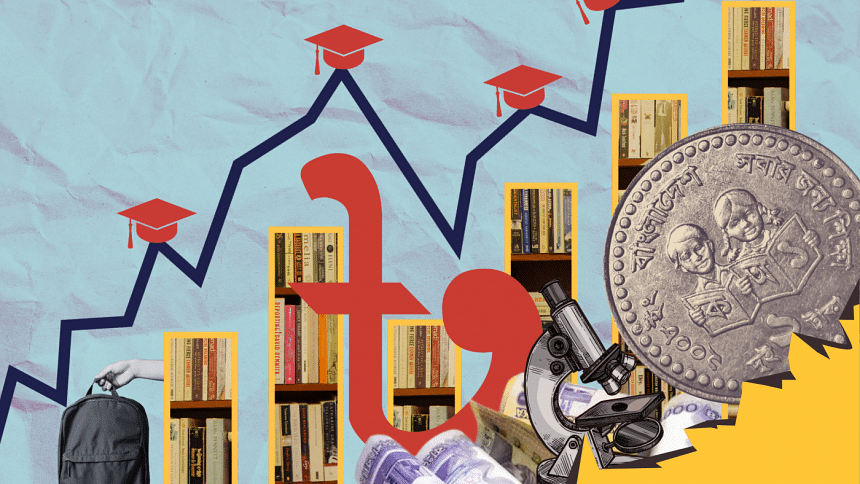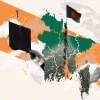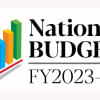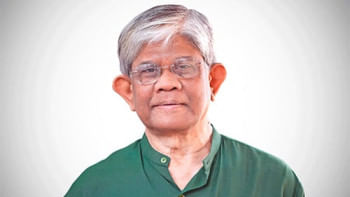Breaking down the FY2024-25 education budget

The budget for the FY 2024-25 was unveiled last Thursday, June 6. With it, the state's policy and plans for spending on education were also revealed. The government has proposed to allocate BDT 94,710 crore which is a 7.42 percent increase from the outgoing fiscal year.
Time and again, it has been emphasised that smart citizens are an integral part of building a "prosperous and smart Bangladesh". Thus, 11.88 percent of the total budget has been dedicated to education alone. When broken down, BDT 38,819 crore has been proposed for primary and mass education – a jump from BDT 34,722 crore in the outgoing fiscal year.
As for secondary and higher education, BDT 44,108 crore has been proposed which was BDT 42,839 crore for FY 2023-24. Aside from Primary and Mass education, and Secondary and Higher education, BDT 11,783 crore has been proposed for the Technical and Madrasa Education Division which was BDT 10,602 crore in the last fiscal year.
The budget has increased across all levels of education. On the surface, the numbers appear to align with the government's claims about education being one of the most important sectors to invest in. While there has been an increase in the amount proposed, it simply falls short of global standards.
Such a pattern has also, unfortunately, been evident in the last couple of years with spending as a percentage of GDP either going up in small incremental amounts or falling completely. Spending on education has been less than two percent as a percentage of GDP over the last 15 years and it is one of the lowest amongst the least developed countries.
Mohammad Mojibur Rahman, Professor, Institute of Education and Research (IER), Dhaka University shares his concerns about these trends, "UNESCO recommends investing six percent of the total GDP on education. Even if we aren't investing as much, we could at least be getting closer to that number. Instead, we appear to be focusing elsewhere."

He adds, "The main reason for that is the state administrators. If they have the mind-set that investing in areas other than education is going to yield greater benefits for them, such as prolonging their time in office, then they will proceed to do just that, and the symptoms are evident. It's because of such an outlook by the administrators that has caused the nation to suffer from a lack of interest in investing in education."
"With investment in education decreasing, we will come up short on multiple fronts," he reiterated.
Despite such troubling developments, the state could make the argument that if the proposed budget is spent diligently in the right places and to its full extent, education in Bangladesh could improve drastically. The sectoral allocations for the Annual Development Programme are BDT 16,136 crore and BDT 11,388 crore for the Ministry of Primary and Mass Education and Secondary and Higher Education respectively.
However, a glance at the outgoing fiscal year's numbers reveals that the funds were underinvested. Out of the BDT 14,086 crore that was allocated for Secondary and Higher Education Vision, only BDT 5,502 crore was spent.
"While the overall spending has increased, what must be assured is qualitative spending. There could be overspending as well. The overall expenditure can go up due to inefficiencies in the system or even corruption. So, the spending amount must be justified," said Tanvir Sobhan, Senior Lecturer at the Department of Economics and Social Science at BRAC University.
"A lot of the projects that are undertaken are quite unnecessary. They are pursued despite the existence of more pressing issues. If the necessary projects are really taken up, adequate funds would be invested," asserted Rahman.
"With the aim of building a Smart Bangladesh, a science-based, up to date, and pragmatic new education curriculum has been introduced from the academic year of 2023," said Dr Shirin Sharmin Chaudhury, Speaker of the Jatiya Sangsad in her full budget speech.
She also expanded upon the government's training programmes, especially in the 2022-23 academic year, where 2,98,246 class teachers, 29,564 headmasters, and 597 education-related officials were trained. Science equipment has also been distributed to 20,000 educational institutions with other educational materials also being supplied to 30,000 educational institutions.
While a lot has been said about the new curriculum, how it bodes will boil down to the quality of the teachers and whether or not they can face the challenges that a new curriculum poses. To ensure that of course, will require investment in training human resources. Without the right teachers, the new curriculum will be difficult to execute.
Such a prospect risks stifling the population in more ways than one. After all, education is a means for people to enhance mobilisation, expand their skillset, and strive for a better quality of life. Therefore, these investments must be well accounted for in all aspects because education is perhaps the most important factor in shaping the future of any country.
Abir Hossain is a sub-editor at Campus, Rising Stars, and Star Youth.

 For all latest news, follow The Daily Star's Google News channel.
For all latest news, follow The Daily Star's Google News channel. 








Comments